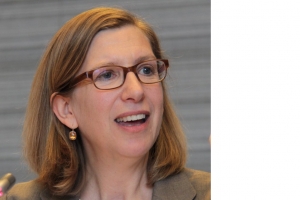
Shauna Olney knew she wanted to become a lawyer ever since she was a child, and having grown up in Vancouver and attended UBC for her undergraduate degree, Allard was the ideal law school for her.
“I remember being eight years old and declaring at a family dinner at my grandma’s house that I wanted to be a lawyer,” she said. “[UBC] was quite a natural place for me to go, and I was really excited when I was accepted. I remember that moment. I was actually sitting at my locker in the arts faculty when I was accepted, and this was a really important moment in my life.”
Olney said she remembers the rigorous work of law school and the connections she made with her peers during her time as a student.
Analyzing the first case, she recalls, “This was a puzzle that we were all going to sort out together… I remember the work was really intense, but it also meant that we had to support each other …. I made some incredible friends that I’m still in touch with today.”
It was also during this time that her interest in labour and human rights developed as she learned more about the law, Olney said.
“I learned about the Charter at UBC … and I was really fascinated and awed by it,” she said. “This was such an amazing, powerful instrument that we were just discovering the boundaries of at that time. For me, the Charter brought labour and human rights together, and it’s also what made me want to clerk for the Supreme Court of Canada, which I was fortunate to have been able to do. Law school was really, really key to awaking that interest.”
After graduating and clerking, Olney worked for firms including Ladner Downs and Clark Wilson before joining the International Labour Organization (ILO), where she spent the majority of the next 30 years.
Olney held numerous positions with the organization, most recently as the Chief of the Gender, Equality and Diversity & ILOAIDS Branch. Her many accomplishments include leading the ILO’s Women at Work Centenary Initiative, and the work that resulted in the right to a world of work free from violence and harassment being articulated in an international treaty for the first time.
In 2019, Apolitical named Olney one of the world’s 100 most influential people in gender policy.
“It was certainly an honour,” she said. “I think it’s a tribute to the many people I’ve worked with in the ILO who, in recent years, have really pushed the boundaries to challenge assumptions, to work courageously in new areas and to dig deep into issues that weren’t as popular.”
Olney is also the author and co-author of several publications in the areas of gender equality and non-discrimination.
Listen to the History Project's full interview with Shauna Olney here.
First published on November 17, 2020.